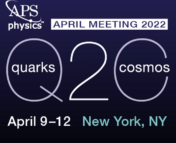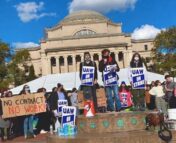Welcome to the Astrobites coverage of the 2022 April APS Meeting! Some of our authors this week were in-person while others attended virtually! We reported on highlights from each day here, from APS Press Conferences to graduate student research talks. If you’d like to see more updates, we encourage you to search the #aprilAPS hashtag on Twitter and look at our coverage of past days of the meeting on Astrobites.
CW: The following deals with the ongoing war in Ukraine and contains information about violence and casualties.
We acknowledge that this is not our field of expertise as astronomers—however, this was an important and impactful session at the 2022 APS April meeting. We want to share the information presented there to our community, especially the relevant actions APS is taking to support scientists, and how astronomers can contribute to the cause. Information in this bite is entirely from the Tuesday APS April Plenary Session X00.
Plenary III: Ukraine and Russia
In response to inquiries and interest from APS members, the society organized a special plenary session at the APS April 2022 meeting to discuss the ongoing invasion of Ukraine. This session featured multiple speakers to dig into different perspectives on the conflict: a history lesson on the region, context on the nuclear weapons situation, a look at past APS relationships with Russia and Ukraine, and a briefing on APS’s current response and next steps.
George Gamota, a physicist with extensive experience working with Ukraine, began by reminding everyone about APS’s history of helping Ukrainian scientists. The response to this new situation is not APS’s first involvement in a political conflict—in fact, they rapidly started up an emergency program in the 1990s for former Soviet scientists who lost their funding after the USSR’s dissolution. Now, according to Gamota, about 95,000 Ukrainian scientists are affected by the ongoing war. About 78,000 of them are still in the country, staying for family or to help the war effort, and 17,000 are refugees, mostly women and children.
Context on the Ukraine/Russia Conflict
Konstantin Sonin, a Professor at University of Chicago and expert on Russian political science and economics, then provided information on the political, economic, and cultural context of the war. Ukraine is a fairly large country—one of the largest in Europe, in fact—but relatively poor, with only $3,000 GDP per capita versus Russia’s $10,000. Its capital, Kyiv, is the 7th largest capital city in Europe and Russia’s Moscow is the largest, and these countries have close ties from their histories. 30-40% of Ukrainians are native Russian speakers.
It’s not unusual in Europe for two neighboring nations to have such intertwined pasts, filled with territorial contests, and Ukraine has a long history both within and without Russia. In 1000 AD, Kyiv was a large European city, and only in the 1700s did it become a city within the Russian empire. Ukraine later became a part of the Soviet Union/USSR in the early 20th century. The 1991 dissolution of the USSR left Ukraine as an independent country, including the territory of Crimea, which had historically been considered a part of Russia. Crimea again became a major issue in 2014, when Russia occupied Crimea and supported separatists in Eastern Ukraine, creating an enclave with Russian military support. Since then, Russian leader Vladimir Putin has become increasingly belligerent, even claiming last year that Russia and Ukraine are the same nation.
The two nations, despite sharing some history, are quite different today—Ukraine is a competitive democracy, and Russia is, as Sonin described, a personalistic dictatorship. He explained that this invasion is, in a way, a direct result of Putin’s skewed worldview: that Ukraine has an unstable government, Ukrainian President Zelenskyy is a puppet of Western governments, the Ukrainian military is incapable, Russian troops would be greeted as liberators, and other nations like the United States and Europe would be too distracted or apathetic to intervene.
Contrary to what Putin expected, the Ukrainians have fought back for almost two months now, and most of the world condemned the invasion and provided significant military assistance to Ukraine while also imposing major sanctions on Russia. Sonin described how the initial Russian military assault failed entirely, resulting in the loss of significant Russian armory and troops. Russian troops have even begun withdrawing from some areas of Ukraine in the past week.
There has been a massively devastating human toll on Ukraine, though — over 2,000 Ukrainian civilians (including children) have been killed, over 4 million people have become refugees, cities have been destroyed, and there has been widespread evidence of war crimes by Russian troops. Over 10,000 Russian soldiers have been killed, along with thousands of Ukrainian soldiers. Ukraine’s economy has been decimated as well, with an expected 45% loss of its GDP. However, Sonin emphasized that fast recovery and sustainable growth for the country are possible, and massive humanitarian aid is needed to help them achieve that. Russia’s economy has similarly suffered, with an expected 10% loss of its GDP in 2022, but the most damaging factor for its future is the severe economic sanctions that have been imposed on the country for its aggression.
Another facet of this conflict is the ongoing information wars within Russia. Independent media have been shuttered, multiple social media sites blocked, and people are being prosecuted, arrested, or detained for protests — or even for saying “war.” The official position of Russia is that the conflict is a “special operation to denazify and demilitarize Ukraine” and evidence of atrocities are “staged provocations.” By contrast, Ukraine has kept its information channels open, except the shuttering of Russia-sponsored channels, and the government regularly provides details on Russian losses that line up with independent media reports, as well as regular briefings from President Zelenskyy. “The world is watching,” said Sonin. He expects that Russia will lose Kyiv, and there will be more battles to come — and the outcome depends on the strength of Ukrainian forces.
The Nuclear Dimension
Siegfried Hecker, a Stanford professor and expert on nuclear weapons policy, explored the possibilities of nuclear involvement in this conflict. The ethics and uses of nuclear weapons have long been a topic of discussion within physics communities, tracing back to their origins in the Manhattan Project. Russia has also been a long-standing player in the realm of global nuclear politics, and at times a cooperative participant in nuclear nonproliferation discussions. But now, Hecker explained, Russia is a “reckless nuclear state” and Putin’s war is “destroying the global nuclear order.”
At the beginning of the current conflict in February, Putin violated the Reagan-Gorbachev Dictum — a Cold-War-era statement that “nuclear war cannot be won and must never be fought” — by placing nuclear weapons on a “special mode of combat duty.” Hecker described the nuclear nonproliferation regime as a “complex international web” that Putin is currently threatening with his actions, such as the Russian occupation of the Chernobyl Nuclear Site and shelling of the Zaporizhzhia Nuclear Power Station. Thankfully, the U.S. had helped Ukraine harden its facilities against extreme external events such as attacks, but this raises questions for everyone: how do we protect nuclear power stations from military attacks? How can personnel respond in real time to de-escalate risks, in the case that armed forces overwhelm a nuclear power plant?
Interestingly, the current sanctions that are impacting gas prices could prompt countries to revisit nuclear power, Hecker said, to lessen countries’ reliance on Russian fossil fuels. Prior to this conflict, Russia had also been a leader in supplying nuclear energy — now, experts are grappling with the question: will they be a responsible supplier in the future? Unfortunately, the answer to that doesn’t seem positive right now, especially given that Putin slowed down nuclear cooperation in the past two decades. Hecker emphasized that cooperation is absolutely necessary to keep the balance of nuclear nonproliferation — and scientists have a key role in this cooperation. Despite some current efforts to cut ties entirely with Russia, Hecker insisted that we must keep our connections to the Russian scientific community alive so that discussion and cooperation is possible.
APS Response to Events in Ukraine
APS’s current approach to the conflict is in good alignment with Hecker’s recommendations. Jonathan Bagger, the CEO of APS, provided a brief update on the society’s responses so far, in alignment with the APS mission to “advocate for physics and physicists, and amplify the voice for science.” All actions are guided by the Committee on International Scientific Affairs (CISA) and reviewed by the Board of Directors. The society has issued several statements, such as one last year on the international nature of science, declaring that “APS will continue to take action in support of the human and professional rights of scientists in all countries.” Recently, they have shared a response to the crisis in Ukraine condemning the invasion, as well as a statement decrying the nuclear power plant attacks. They have also consulted with Ukrainian science leaders in the United States, and written letters of support to the Ukrainian Physical Society and the National Academy of Sciences of Ukraine. Additionally, APS has been coordinating with the Polish Physical Society and other European partners, as well as other domestic scientific societies and the U.S. government, to find out how to best support Ukrainian physicists at this time.
CISA has urged the Board of Directors to support affected physicists, foster engagement, and direct sanctions only towards institutions — not individuals, recalling Hecker’s advice. (Note: any sanctions taken will be proposed by CISA and approved by the Board of Directors, along with a formal statement, and will follow any and all legal constraints.) This policy is consistent with Cold War actions from APS, as well as their response to a recent call to boycott Israeli scientists — APS does not want to isolate any scientific community, and instead wants to promote collaboration and cooperation between scientists.
Manuscripts in APS journals will continue to be reviewed entirely on scientific merit, and APS is supporting affected physicists by providing complimentary journal and virtual meeting access, as well as free APS membership and assistance covering publication charges. There are multiple ways for individuals to help as well, such as supporting short-term scholar visits, donating to the National Academy of Sciences Safe Passage Fund or the ALLEA European Fund for Displaced Scientists, or making other personal donations to aid organizations like the Red Cross. While we don’t want to contribute to “brain drain” in Ukraine, Bagger explained, we do want to give people a safe place to stay, and continue their science, if needed.
The most recent updates on the APS response to events in Ukraine and more information on ways to help can be found on this dedicated webpage.
The recording of this session (X00) will be available to registered April APS attendees until July 12, 2022 at the link here.
Featured Image Credit: APS April 2022
Edited By: Sumeet Kulkarni, Huei Sears, Katya Gozman


